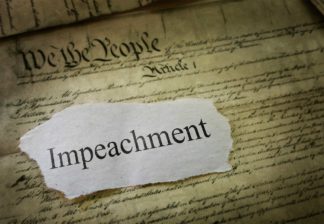By Del Reed and Alicia Kubas
Civic Engagement Committee | University Libraries
With the current impeachment proceedings underway for President Donald Trump, it’s important to understand how impeachment works and the earlier precedents for impeachment.
When the founding fathers wrote the Constitution of the United States they were fully aware of the possibility of corruption and abuse of power by elected and appointed officials alike, and thus introduced a series of checks and balances to address such a possibility. They formed three co-equal branches of government, the Executive, Legislative, and Judicial branches and introduced regular elections to ensure the peaceful transfer of power.
Having freed themselves from Great Britain — whose king was unelected and could be removed from power only by a revolution — they also introduced the power of impeachment as a means of removing a corrupt official from office. In particular, according to Article II section 4 of the Constitution of the United States: “The President, Vice-President and all civil Officers of the United States shall be removed from office on Impeachment for, and Conviction of, Treason, Bribery, or other high Crimes and Misdemeanors.”
According to the Constitution, the House of Representatives has the sole power of issuing articles of impeachment (The Constitution of the United States Article 1 section 2) while the Senate has the sole power of conducting a trial, presided over by the Chief Justice of the Supreme Court. If two-thirds of the senators vote in favor of impeachment, the official shall be removed from office (The Constitution of the United States Article 1 section 3).
A brief history of impeachment
Ironically, the process of impeachment was first used, “by the English Parliament in 1376, to wrest power from the King by charging his ministers with abuses of power, convicting them, removing them from office, and throwing them in prison” (Lepore 26). By the time of the American Revolution the practice had fallen into disuse in England.
The first American official to be impeached was the U.S. Senator from Tennessee, William Blount, in 1797 on charges of conspiring to assist England’s attempt to seize Spanish controlled territories in modern day Florida and Louisiana. Charges were dismissed but Blount was removed from office before a trial.
Many federal officials and presidents have been threatened with impeachment, but it is rarer for impeachment proceedings to progress through hearings and finally to a vote in the House. In U.S. history, 19 officials have been impeached. Of those, seven were convicted, seven were acquitted, three resigned before conviction, and one was removed from office before a trial.
Only two presidents have been impeached — Andrew Johnson in 1868, for violating the Tenure of Office Act when he removed Secretary of War Edwin Stanton from office, and Bill Clinton in 1998, for lying under oath to a Federal Grand Jury and obstruction of justice.
Neither president was convicted in the Senate, although Johnson avoided being convicted by only one vote. While Richard Nixon was never impeached, he retired from office under the threat of impeachment.
Freely available government resources
- U.S. House of Representatives: History, Art, and Archives, Origins & Development: From the Constitution to the Modern House: Impeachment
- U.S. House of Representatives: History, Art, and Archives, List of Individuals Impeached by the House of Representatives
- Congressional Research Service, Impeachment Investigations: Law and Process, October 2, 2019
- U.S. House Intelligence Committee, Trump Impeachment Inquiry hearings, November 2019
News articles to frame the issue
- Bowman, F. (2019). An impeached and convicted Trump could still run in 2020. The Washington Post, p. The Washington Post, Nov 6, 2019.
- Broughton, J. (2017). Conviction, Nullification, and the Limits of Impeachment as Politics. Case Western Reserve Law Review, 68(2), 275.
- Lepore, Jill. (2019) “You’re Fired: a short account of the long history of Impeachment.” The New Yorker, October 28, 2019, 26-31.
Library Resources
- Gerhardt, M. (2018). Impeachment : What everyone needs to know. New York, NY: Oxford University Press.
- Melton, B. (1998). The first impeachment : The constitution’s framers and the case of Senator William Blount (1st ed.). Macon, Ga.: Mercer University Press.
- Tribe, L., & Matz, J. (2018). To end a presidency : The power of impeachment (1st ed.). New York, NY: Basic Books.
The Federalist Papers contain two sections, LXV and LXVI, written by Alexander Hamilton that discuss the issue of impeachment.
- Hamilton, Madison, Jay, Rossiter, Kesler, Hamilton, Alexander, . . . Kesler, Charles R. (1999). The federalist papers. New York: Mentor.
- Grofman, Wittman, Grofman, Bernard, & Wittman, Donald A. (1989). The Federalist Papers and the new institutionalism. New York: Agathon Press.
- Meyerson, M. (2008). Liberty’s blueprint : How Madison and Hamilton wrote the federalist papers, defined the constitution, and made democracy safe for the world. New York: Basic Books.
- Wirls, D. (2015). The federalist papers and institutional power in American political development (1st ed., Palgrave pivot). New York, NY: Palgrave Macmillan.
University of Minnesota expertise
Larry Jacobs: McKnight Presidential Chair in Public Affairs, the Walter F. and Joan Mondale Chair for Political Studies, and director of the Center for the Study of Politics and Governance in the Hubert H. Humphrey School and the Department of Political Science at the University of Minnesota
Heidi Kitrosser: Robins Kaplan Professor of Law
Alicia Kubas: Government Publications & Data Librarian
Mary Schoenborn: Public Policy Librarian
Rafael E. Tarrago: Librarian for History, Political Science, and Iberian, Ibero-American & Chicano Studies




